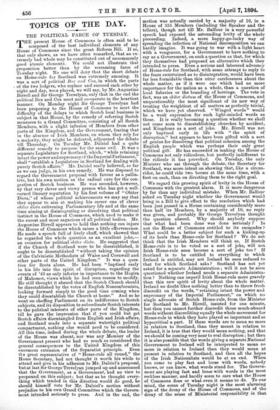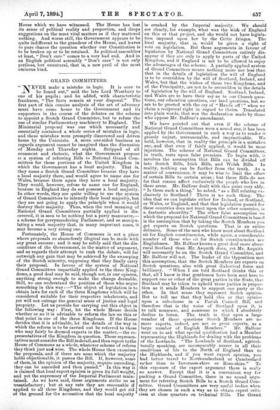TOPICS OF THE DAY.
THE POLITICAL FARCE OF TUESDAY.
THEpresent House of Commons is often said. to be composed of the best individual elements of any House of Commons since the great Reform Bill. If so, that only shows, as we have often remarked, that an ex- tremely bad whole may be constituted out of uncommonly good atomic elements. We could not illustrate that proposition better than by the screaming farce of Tbesday night. No one will deny that the short debate on Home-rule for Scotland was extremely amusing. It was a sort of political Box and Cox, in which the parts . of the two lodgers, who replace and succeed each other by night and day, wei e played, we will say, by Mr. Augustine Birrell and Sir George Trevelyan, only that in the end the political Box and Cox meet and co-operate in the heartiest manner. On Monday night Sir George Trevelyan had been proposing to the House of Commons to meet the difficulty of the delays to which Scotch local business is subject in that House, by the remedy of referring Scotch measures to a Grand Committee, consisting of all Scotch Members, with a slight infusion of Members from other parts of the Kingdom, and the Government, fearing that in the absence of Irish Members, on whom they rely for a majority, they might be defeated, adjourned the debate till Thursday. On Tuesday Mr. Dalziel had a quite different remedy to propose for the same evil. It was a separate Legislature for Scotland, which, "while retaining intact the power and supremacy of the lm penal Parliament," shall "establish a Legislature in Scotland for dealing with purely Scotch affairs." Mr. Dalziel really believed, so far as we can judge, in his own remedy. He was disposed to regard the Government proposal with favour as a pallia- tive, but his own motion as the radical cure for the con- gestion of Scotch business. He was seconded, however, by that very clever and viewy person who has got a well- earned literary reputation by his first volume of " Obiter Dicta," of whose politictal achievements we may say that they appear to aim at making his career one of clever °biter dicta enlivening Parliamentary life and at the same time aiming at disintegrating or dissolving that political instinct in the House of Commons, which used to make it the surest and most sagacious of all political bodies. Mr. Augustine Birrell appears to hold that nothing can injure the House of Commons which raises a little effervescence. He made a speech full of lively chaff, which showed that he regarded the whole question as an excellent joke,— an occasion for political obiter dicta. He suggested that if the Church of Scotland were to be disestablished, it ought to be disestablished "without taking the opinion of the Calvinistic Methodists of Wales and Cornwall and other parts of the United Kingdom." It was a ques- tion for Scots alone. He had been "baptised early in his life into the spirit of disruption, regarding the events of '43 as only inferior in importance to the Hegira of Mahomet, views which he had seen reason to modify. He still thought it absurd that the Scotch Church should be disestablished by the votes of English Nonconformists, looking forward simply to the good time coming when they could disestablish the Church at home." And so he went on chaffing Parliament on its indifference to Scotch subjects, and its disposition to subordinate Scotch interests to the political interests of other parts of the Kingdom, till he gave the impression that if you could but get Scotch affairs disentangled from English and Irish affairs, and Scotland made into a separate watertight political compartment, nothing else would need to be considered. All this time, indeed during the whole debate, the leader of the House was absent, nor was any Member of the Government present who bad so much as considered the general consequences to the United Kingdom of this enormous extension of the Separatist principle. Even the great representative of "Home-rule all round," the Home Secretary, had not thought it worth his while to attend and give in his adhesion to Mr. Dalziel's proposal, but at last Sir George Trevelyan jumped up and announced that the Government, as a Government, had no view to propound on this subject; but that as he thought every- thing which tended in this direction would do good, he should himself vote for Mr. Dalziel's motion without prejudice to his own Grand Committee which the Govern- ment intended seriously to press. And in the end, the motion was actually carried by a majority of 10, in House of 355 Members (including the Sneaker and the tellers), though not till Mr. Balfour in a very powerful speech had exposed the astounding levity of the whole proceeding. Indeed, a more happy-go-lucky way of spreading the infection of National decomposition we can hardly imagine. It was going to war with a light heart with a vengeance, for a Government to have nothing to. say as a Government, on such a question as that, for which they themselves had proposed an alternative which they intended to press. Even a serious and laboured advocacy of Home-rule for Scotland, with some attempt to reply to the fears entertained as to disintegration, would have been far less formidable than this utter carelessness about the whole matter, as if it were one which had no more importance for the nation as a whole, than a question of local fisheries or the branding of herrings. The vote in fact, was an °biter dictusz of the House of Commons, and unquestionably the most significant of its new way of treating the weightiest of all matters as perfectly trivial, which we have yet observed. "Winged words" would be a weak expression for such light-minded words as these. It is really becoming a question whether we shall not come soon to disestablishing churches by accident, and Kingdoms as a sort of joke. Mr. Birrell was not only baptised early in life with "the spirit of disruption," but appears to have been gifted with a sort of genius for dissolving that political cohesion among the English people which was perhaps their only great political gift. He has succeeded in making the House of Commons not only ridiculous, but perfectly indifferent to the ridicule it has provoked. On Tuesday, the only Minister who sat through the debate, the Secretary for Scotland, was more intent on showing that, like a circus- rider, he could ride two horses at the same time, with a- foot on each, than on directing them to the right goal.
We regard this growing spirit of levity in the House of Commons with the greatest alarm. It is more dangerous by far than any individual mistake. When Mr. Balfour asked on Tuesday night whether the Government would bring in a Bill to give effect to the resolution which had been just passed in a House containing considerably more than half its Members, by a majority of 10, no reply was given, and probably Sir George Trevelyan thought the question absurd. Why should anybody suppose that what had been done was done seriously ? Is not the House of Commons entitled to its escapades ? What could be a better subject for such a kicking-up of its heels than Home-rule for Scotland ? We do not think that the Irish Members will think so. If Scotch Home-rule is to be voted as a sort of joke, will not Irish Home-rule soon become a sort of joke too ? If Scotland is to be entitled to everything to which Ireland is entitled, may not Ireland be soon reduced to that for which Scotland asks ? Scotland has not yet asked for a separate Administration ; will it not be soon questioned whether Ireland needs a separate Administra- tion? Nothing can imperil Irish Home-rule more gravely than this new spirit of levity about the whole matter. Ireland no doubt likes nothing better than to throw fresh discredit on the words, "retaining intact the power and supremacy of the Imperial Parliament," on which no single advocate of Scotch Home-rule, from the Minister for Scotland to Mr. Birrell, insisted for one minute, but then you cannot further discredit those much-abused words without discrediting equally the whole movementfor Home-rule in which they have played so important and so hypocritical a part. If these words are to mean no more in relation to Scotland, than they meant in relation to Ireland, it is true that they would mean nothing, and that we should be coming very near to real disruption ; but then it is also possible that the words giving a separate National Government to Ireland will be interpreted to mean no more in relation to Ireland than they would mean at present in relation to Scotland, and then all the hopes of the Irish Nationalists would be at an end. When you come to play fast and loose with words, nobody knows, or can know, what words stand for. The Govern- ment are playing fast and loose with words in the most reckless manner, and hardly seem to care what the House of Commons does or what even it means to do. To our mind, the scene of Tuesday night is the most alarming sign of the decay of the House of Commons, and of the decay of the sense of Ministerial responsibility in that House which we have witnessed. The House has lost its sense of political reality and proportion, and drops suggestions on the most vital matters as if they mattered nothing. And worse still, the Government appears to be quite indifferent to the grandeur of the House, and leaves to pure chance the question whether our Constitution is to be broken up or to be retained. In political assemblies at least, "Don't care" comes to a very bad end. And in an English political assembly "Don't care" is not only perilous, but unnatural, that is, a new peril of the most ominous kind.







































 Previous page
Previous page